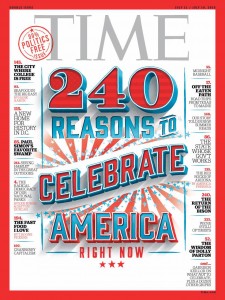The Bright Side in America Today
< < Go Back
by David Von Drehle,
Because I write about current events for a living, people often let me know their thoughts and worries. By far the most common question I hear goes something like this: Have Americans ever been more divided than we are today? Given that every schoolchild learns of our brutal Civil War–in which more than 600,000 people died, a President was assassinated, and the economies of 11 Southern states were decimated–it’s an alarming query.
Yes, things have been much worse … but it’s scary that we’re asking.
I think the question reflects a widespread worry that America is becoming brittle, that we are hung up on differences when the times demand unity of purpose. On this 240th birthday of the USA, it’s fair to ask, Are we any more prepared to absorb domestic tensions and respond to international turmoil–from refugee crises to Brexit–than we were in earlier eras? Are we growing stronger with age, or have the institutions of American society become feeble?
Other pillars of American life are just as shaky. Congress, the media, Big Business and Wall Street have all squandered faith. Authority figures from judges to police officers, schoolteachers to elected officials, are teetering in a rising tide of skepticism. The practice of religion–especially Christianity–is in decline, according to the Pew Research Center, while the ivory tower of academia is besieged.
The historian Henry Adams noted this in his classic autobiography. At the turn of the 20th century, in the dawn of X-rays, automobiles and wireless communication, he found himself standing near a faintly humming electrical generator–the state of the art in unseen power–on display in a Paris exhibition hall. “The new forces were anarchical,” he declared of these invisible, irresistible transformations. “Man had translated himself into a new universe,” and Adams “found himself lying in the Gallery of Machines at the Great Exposition of 1900, his historical neck broken by the sudden irruption of forces totally new.”
The new forces were anarchical.
On this Independence Day 2016, we may reasonably feel like hostages to our own newfound freedom, blindfolded and bound in the trunk of a careening car called change.
On the other hand, July 4th is our annual reminder that America is very good at constant revolution. No matter how buffeted and disjointed by change we may feel, in the end we emerge with the reins in our hands. And this is due–interestingly, ironically–to the very same impulse that currently works to divide us: individualism. Despite the distortions created by the digital upheaval, America’s greatest strength is still its people power.
Our ability to decentralize decisionmaking, to unleash the strength and creativity of individuals, is the bright side of our current situation.
American people power looks small in comparison to Globalization, Digitalization, Disintermediation, Radicalization–the entropic forces at large in the world that are both vast and immediate, too big to fully grasp, yet too intrusive to ignore. And people power can easily be mistaken for selfishness, narcissism, irresponsibility.
somehow, our bone-deep pragmatism endures. America thrives under leaders who inspire initiative in others; we do best when government unleashes the people power. Top-down solutions involve a single bet on one person, one idea, one program. Bottom-up grabs a share of every bet in the whole casino.
In the cyclone of change, there is an impulse to say no.
Under the dark cloud that seems to have settled over our times, we are weaving this silver lining. We individual human beings, pursuing our own happiness in our own imperfect ways, together make our own unstoppable force. Far from helpless in the grip of change, we have inherited a power more potent than any strongman, ideology or terror. It is ageless. Whether it is enough to win the future is a question born anew with each morning.
Safe to say, though: it’s our best bet.
More From TIME Magazine:




